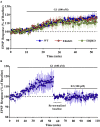G Protein-Coupled Estrogen Receptor: Rapid Effects on Hippocampal-Dependent Spatial Memory and Synaptic Plasticity
- PMID: 32587576
- PMCID: PMC7298106
- DOI: 10.3389/fendo.2020.00385
G Protein-Coupled Estrogen Receptor: Rapid Effects on Hippocampal-Dependent Spatial Memory and Synaptic Plasticity
Abstract
In the hippocampus, estrogen regulates gene transcription linked to neuronal growth, neuroprotection, and the maintenance of memory function (1-3). The mechanism is likely to involve genomic regulation through classic estrogen receptor (ER) signaling cascades that influence transcription. Estrogens binding to classic nuclear ERs, alpha (ERα) and beta (ERβ), and have pleotropic effects on development, behavior, and neurophysiological functions, including synaptic plasticity and memory consolidation (4-7). In addition to ERα and ERβ, estrogen can also initiate activation of classical second messenger signaling cascades to influence the activity of G-proteins and a host of kinases, resulting in rapid changes in physiology (8-14). These rapid effects of estrogen are commonly mediated by membrane receptors. In the late 90s, multiple laboratories cloned cDNA/gene for an orphan G-protein-coupled receptor with very low homology with other G-protein-coupled receptors and named it G-protein-coupled receptor 30 (GPR30) (15-20). Later in 2007, the International Union of Basic and Clinical Pharmacology designated GPR30 as G protein-coupled estrogen receptor (GPER) (21); GPER is a seven-transmembrane G-protein-coupled receptor, predominantly expressed on the cell membrane (22). Interestingly, GPER is reported to mediate many of the rapid responses of estradiol in the adult brain, and is widely distributed in the mammalian brain including the plasma membrane of hippocampal neurons (23-31). GPER modulates second messenger signaling cascades involving Gαs- and Gαi/o-associated increase in cyclic adenosine monophosphate and phosphoinositide 3-kinase or Src protein kinase respectively (32, 33). Activation of GPER is also associated with phospholipase C, and the inositol receptor and ryanodine receptor-mediated increase in intracellular calcium (24, 34). This commentary is concentrated specifically on the possible rapid effects of GPER in hippocampal-dependent spatial memory function and synaptic plasticity.
Keywords: GPER; estrogen; estrogen receptor; spatial memory; synaptic plasticity.
Copyright © 2020 Kumar and Foster.
Figures

Similar articles
-
17β-Estradiol and Agonism of G-protein-Coupled Estrogen Receptor Enhance Hippocampal Memory via Different Cell-Signaling Mechanisms.J Neurosci. 2016 Mar 16;36(11):3309-21. doi: 10.1523/JNEUROSCI.0257-15.2016. J Neurosci. 2016. PMID: 26985039 Free PMC article.
-
GPR30-mediated estrogenic regulation of actin polymerization and spatial memory involves SRC-1 and PI3K-mTORC2 in the hippocampus of female mice.CNS Neurosci Ther. 2019 Jun;25(6):714-733. doi: 10.1111/cns.13108. Epub 2019 Feb 3. CNS Neurosci Ther. 2019. PMID: 30714337 Free PMC article.
-
Position paper: The membrane estrogen receptor GPER--Clues and questions.Steroids. 2012 Aug;77(10):935-42. doi: 10.1016/j.steroids.2012.04.001. Epub 2012 Apr 10. Steroids. 2012. PMID: 22521564 Review.
-
Does GPER Really Function as a G Protein-Coupled Estrogen Receptor in vivo?Front Endocrinol (Lausanne). 2020 Mar 31;11:148. doi: 10.3389/fendo.2020.00148. eCollection 2020. Front Endocrinol (Lausanne). 2020. PMID: 32296387 Free PMC article. Review.
-
Dorsal Hippocampal Actin Polymerization Is Necessary for Activation of G-Protein-Coupled Estrogen Receptor (GPER) to Increase CA1 Dendritic Spine Density and Enhance Memory Consolidation.J Neurosci. 2019 Nov 27;39(48):9598-9610. doi: 10.1523/JNEUROSCI.2687-18.2019. Epub 2019 Oct 18. J Neurosci. 2019. PMID: 31628182 Free PMC article.
Cited by
-
Female mice lacking membrane estrogen receptor alpha display impairments in spatial memory.Horm Behav. 2024 Aug;164:105597. doi: 10.1016/j.yhbeh.2024.105597. Epub 2024 Jun 29. Horm Behav. 2024. PMID: 38944999 Free PMC article.
-
Identification of a human estrogen receptor α tetrapeptidic fragment with dual antiproliferative and anti-nociceptive action.Sci Rep. 2023 Jan 24;13(1):1326. doi: 10.1038/s41598-023-28062-9. Sci Rep. 2023. PMID: 36693877 Free PMC article.
-
Sex steroid hormones, the estrous cycle, and rapid modulation of glutamatergic synapse properties in the striatal brain regions with a focus on 17β-estradiol and the nucleus accumbens.Steroids. 2024 Jan;201:109344. doi: 10.1016/j.steroids.2023.109344. Epub 2023 Nov 17. Steroids. 2024. PMID: 37979822 Free PMC article. Review.
-
Anti-Inflammatory Actions of G-Protein-Coupled Estrogen Receptor 1 (GPER) and Brain-Derived Estrogen Following Cerebral Ischemia in Ovariectomized Rats.Biology (Basel). 2023 Jan 9;12(1):99. doi: 10.3390/biology12010099. Biology (Basel). 2023. PMID: 36671793 Free PMC article.
-
Raloxifene as Treatment for Various Types of Brain Injuries and Neurodegenerative Diseases: A Good Start.Int J Mol Sci. 2020 Oct 14;21(20):7586. doi: 10.3390/ijms21207586. Int J Mol Sci. 2020. PMID: 33066585 Free PMC article. Review.
References
Publication types
MeSH terms
Substances
Grants and funding
LinkOut - more resources
Full Text Sources
Miscellaneous

